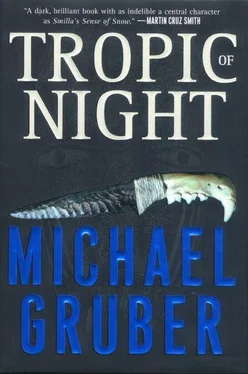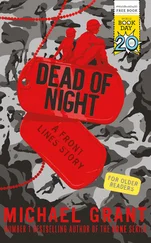Michael Gruber - Tropic of Night
Здесь есть возможность читать онлайн «Michael Gruber - Tropic of Night» весь текст электронной книги совершенно бесплатно (целиком полную версию без сокращений). В некоторых случаях можно слушать аудио, скачать через торрент в формате fb2 и присутствует краткое содержание. Жанр: Полицейский детектив, на английском языке. Описание произведения, (предисловие) а так же отзывы посетителей доступны на портале библиотеки ЛибКат.
- Название:Tropic of Night
- Автор:
- Жанр:
- Год:неизвестен
- ISBN:нет данных
- Рейтинг книги:4 / 5. Голосов: 1
-
Избранное:Добавить в избранное
- Отзывы:
-
Ваша оценка:
- 80
- 1
- 2
- 3
- 4
- 5
Tropic of Night: краткое содержание, описание и аннотация
Предлагаем к чтению аннотацию, описание, краткое содержание или предисловие (зависит от того, что написал сам автор книги «Tropic of Night»). Если вы не нашли необходимую информацию о книге — напишите в комментариях, мы постараемся отыскать её.
Tropic of Night — читать онлайн бесплатно полную книгу (весь текст) целиком
Ниже представлен текст книги, разбитый по страницам. Система сохранения места последней прочитанной страницы, позволяет с удобством читать онлайн бесплатно книгу «Tropic of Night», без необходимости каждый раз заново искать на чём Вы остановились. Поставьте закладку, и сможете в любой момент перейти на страницу, на которой закончили чтение.
Интервал:
Закладка:
Providence is set in perfectly trimmed grounds on Main Highway, graced by palms and banyans and bougainvillea, a set of low structures in Spanish Mission style, red tile roofing over stucco painted pink as lips. I turn Luz over to the nice Ms. Lomax, her teacher, who coos a greeting tinged with that special tone people like Ms. Lomax use for those not so fortunate as they. Everyone and everything is nice at Providence. The milk of human kindness sloshes ankle-deep over its polished floors. The kids are brightly scrubbed and dressed in designer clothes, or darling faux-casual rich hippie stuff, and the mothers are all as shiny as their Mercs and Range Rovers. The nice makes me feel like a troll or a night-hag, or a t’chona, the river wight of the Olo, who comes at night and sits on the faces of dreamers and gives them dreams of smothering that are not only dreams. I am grateful; I want Luz to be surrounded by nice here and for her whole life, and yet I want to smash it, too; I want to open nice, plump Ms. Lomax up like a can of beans. My husband, I know, felt like this all the time, although he managed to keep it under wraps for a good long while, until he got to Africa. Africa will do that; Carl Gustav Jung took one look and ran like a thief back to cozy Zurich.
Luz goes without a backward glance, as she has from the first day. Utter security, is it, or does she not even care, like a cat? Olo children are like that, I recall, after they have made the sefune bond with their foster parents, so I suppose it’s all right. Or I’m crazy, which is always around eight-to-five probable these days.
I drive back to U.S. 1 and up to I-95, which I take to the East-West freeway and then off at Twelfth Avenue. It’s my only luxury, this driving to work. Parking and running the car cost nearly as much as my rent, but I don’t like the metrorail, the only American equivalent of African bus travel. Now that I have a child to raise, I don’t know if I can continue, although so far she’s cost little more to keep than a small dog. Perhaps I can find another source of income. It can’t have any sex in it, or drums, or smiling (cross out the ads that want personable, good with people) or snappy dressing. Computers? I know how to use one, and perhaps I could learn a programming language. On the other hand, so few women in that field, I wouldn’t want to stand out, no. Maybe I could tell fortunes, ha-ha.
Jackson Memorial Hospital, unlovely and vast, the great public pesthouse of Miami, lifts its many mansions in Overtown, hard by the freeway, convenient for both the walking poor and their driving healers. I park in my unguarded surface lot and leave the windows open. It is cheaper than the enclosed parking palaces and I don’t think anyone will bother to steal my car. I must walk two streets to the entrance to my building, however, and on the corner of Tenth is a convenience store where the homeboys hang. Hip-hop is playing loud enough to feel through my feet, but the beat is so utterly banal that it is more like the pounding of some dumb machine and it does not engage me. I try for invisibility as I go by. There are only a few boys and it’s hot and no one bothers me. I have been mugged three times, which is why I carry my cash and my ID and keys in a pouch hung around my neck, a trick of travelers in the third world. My purse is plastic, yellow, $6.99 at Kmart, in case anyone wants it.
When I say “invisible” I mean American urban invisibility, not faila’olo, the invisibility of the sorcerers, which I have not learned how to do. I rather suspect my husband is well up on it, though.
We work underground, in the basement of building 201, next door to the emergency room. Medical records don’t require the cheering rays of the sun. Sometimes I imagine I can hear the cries of those in emergency care, but it must be only the ambulance sirens. Still, it contributes to the impression of being confined in a dungeon at hard labor. I pass through the swinging doors and into the reception area, where the files are dropped off and picked up by the ward messengers. I nod to the clerk behind his counter, which is barely acknowledged, and pass through to the file room where I work. It is long and low-ceilinged and brightly lit by tubes behind rectangles of frosted plastic. Two rows of desks march down the center, and on either side are the banks of motorized filing cabinets, with corridors between them. As I enter, one of the messengers shoves off with a cart loaded full with brightly tabbed hanging files. “Yo, Dolores,” he says, waving. I always get a nice greeting from Oswaldo, as he is mentally retarded.
Several of the messengers are similarly afflicted. We file clerks are thus the elite of the medical records section. We are required to have total mastery of alphabetical order. Some of us, like me, work on retrieval, while others work on putting the files back in their proper places in the cabinets, or, to use our technical term, “filing” them. Lives are at stake here and well do we know it. If we forget, Mrs. Waley is there to remind us. Mrs. Waley is our supervisor, and I see her now staring out at us from her little glassed-in office, as if she were a tourist in an aquarium and we were the fishes.
Mrs. Waley is a yellowish, freckled woman with hair like black plastic, shiny and sculpted around her circular face. She must weigh well over 250 pounds, and I am afraid that some of the younger staff call her the Whale. I don’t. I have the greatest respect for Mrs. Waley. She’s been at Jackson for nearly twenty years and claims never to have missed a day of work. She began before computers, as she often remarks, and I believe she thinks they are something of a fad. She dresses in very bright colors, purple, scarlet, primrose yellow, and today she wears a pantsuit the color of the green stripe in the flag of Mali. She wears a purplish lipstick and artificial nails, also brightly colored, and more than an inch long, like those of a mandarin. I suppose she is a mandarin, of sorts. She is careful never to do any physical work.
Mrs. Waley does not like me overmuch. At first I thought it was because Dolores Tuoey had claimed on her phony resume a college degree and a spell as a nun, but I heard from some of the other staff that she thought I was a management plant, a spy. Why else would someone with an education work here? I gave out that it was doctor’s orders; I couldn’t take any pressure. This seemed to satisfy her, and ever since she’s treated me as a potentially dangerous lunatic. I hoped at first that she might relent, and move me into the harmless lunatic category, for I’ve given two years and four months of good service, never once forgetting the order of the alphabet or foisting a McMillan in place of a desired McMillian, a common error among the retrievers. Latterly, I’ve decided that she does not like me because I am a white person, the only one in her domain.
My in-basket is full of record request forms that have accumulated during the night. I sort them by service and last name. This is something of an innovation, I’m afraid. Mrs. Waley instructed me during my orientation that I was to take the eldest, or bottom, request first, complete the task, and then go on to the next one. She showed me how to turn the pile of forms over so that the eldest form was (marvelously!) positioned on top. My breakthrough methodology means, however, that I can get my stack done in about a third of the time the other way requires, and so I do it, and hope that Mrs. Waley doesn’t catch me and make me stop. The time thus saved I devote to reading medical records, walking slowly through the narrow corridors, between the buff walls of softly shining steel. This is something so beyond the scope of Mrs. Waley’s imagination that she hasn’t thought to specifically forbid it, although it is, of course, a state and federal crime. Reading files is much like doing anthro research. It amuses me, and passes the time.
Читать дальшеИнтервал:
Закладка:
Похожие книги на «Tropic of Night»
Представляем Вашему вниманию похожие книги на «Tropic of Night» списком для выбора. Мы отобрали схожую по названию и смыслу литературу в надежде предоставить читателям больше вариантов отыскать новые, интересные, ещё непрочитанные произведения.
Обсуждение, отзывы о книге «Tropic of Night» и просто собственные мнения читателей. Оставьте ваши комментарии, напишите, что Вы думаете о произведении, его смысле или главных героях. Укажите что конкретно понравилось, а что нет, и почему Вы так считаете.












